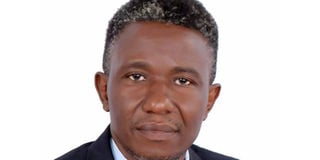Kazinda’s big money and when the “wrong arm of the law” comes calling

What you need to know:
- Turned out he had asked some repairmen to do some work on the windows and he was just checking to make sure they had delivered value for his money. I thought he was stooping too low – a man of his status – checking on window repairs. I told him as much.
Two decades ago, I was walking down the stairs at Spear House, Kampala, when I chanced upon renowned tycoon Gordon Wavamunno, aka Wava, checking the windows keenly.
Turned out he had asked some repairmen to do some work on the windows and he was just checking to make sure they had delivered value for his money. I thought he was stooping too low – a man of his status – checking on window repairs. I told him as much.
He turned and looked at me straight in the eye and explained that this was his own money and because he had earned it slowly and painfully, he was not in the habit of letting people take him for granted, delivering poor workmanship, because they were working for a tycoon who was so rich, he wouldn’t notice, or mind.
It was a life lesson: when money is hard-earned, you’ll be hard-pressed to splash it anyhow. When you earn through actual sweat and honesty, you are dis-inclined to spend without a thought, or spending to impress society.
Way before what civilised countries call “the long arm of the law” and in our backward countries with primitive governments is better called “the wrong arm of the law”, caught up with him, many of us knew all about Geoffrey Kazinda.
You cannot hide big money in a small town, in a poor country – even a few shillings will have everyone talking.
But Kazinda had gone several notches higher: a very young man, with lots of monies, and throwing them around casually, in a small town.
There is something we non-economists call the economics of space and time. Something to do with how people fare economically across space and time (time of life and time span within which they initiate and complete projects).
When a country is small and very poor, it imposes a low ceiling on most (not all) of its citizens; so that there is only so much you can do, given the tough economic circumstances.
And even whatever you do, can only be done within certain time frames, owing to the harsh economic environment in which you operate.
In such cases, money ideally increases as you grow, so that the really big money comes a little later in life; making exceptions for unusual genius, or luck, etc.
When you see people with lots of easy money, in a country known to be poor and they are throwing it around casually, without thinking, chances are, something is not right.
When you see apartment blocks going up in the twinkling of an eye, and there is no bank loan behind, something is not right. When people buy very expensive cars so easily, yet their earnings impose a low ceiling, something is not right. When people are operating in a completely different economy from the one that is known to everyone else, there really ought to be some explaining done.
Many of us, therefore, thought that Kazinda, then principal accountant in the Office of the Prime Minister (OPM), who has been in jail for most of the previous decade, and has now been sentenced to 40 years in jail on several corruption-related charges, had some explaining to do.
Government, predictably, will be quick to hail the verdict as a victory in its fight against corruption; which is hypocrisy of the worst kind, because truth is that no matter how you look at it, Kazinda is only a sacrificial lamb.
Had he been better politically connected and even geographically located, he would be at home happily sipping a beer and munching pork ribs, as he watches his favourite team (looked like an Arsenal fan) lose another game it ought to have won.
The mid-level bureaucrats like Kazinda have never been a problem; the real rot is occasioned and orchestrated by those who wield political power.
Most of them ought to have preceded Kazinda in jail, many years ago. Kazinda’s, therefore, is not a case of the “long arm of the law”; it is clearly one of “the wrong arm of the law”.
Mr Tegulle is an advocate of the High Court of Uganda [email protected]




